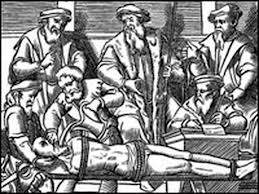Controversy over waterboarding has surfaced in recent years. There are two different techniques when referring to waterboarding. The first involves pumping water directly in the stomach. “This creates intense pain. It feels like your organs are on fire,” says Darius Rejali, a professor at Reed College. The other technique which is most commonly used involves lying the suspect in an incline position and pouring water on their face. The face is usually covered by a towel or cloth. This creates instant fear of drowning for the suspect. Proponents of waterboarding will argue that it is a legitimate method of interrogation that has saved lives in our war against terrorism while opponents insists it violates United States law as an inhumane form of torture.

The debate over waterboarding is new, but the interrogation technique is not. “Its use was first documented in the 14th century, according to Ed Peters, a historian at the University of Pennsylvania. It was known variously as "water torture," the "water cure" or tormenta de toca — a phrase that refers to the thin piece of cloth placed over the victim's mouth.” In the 14th century it was normal to use water to provoke confessions. "The thing you could not do in torture was injure the body or cause death," Peters says. Waterboarding causes both mental and physical pain while leaving no marks on the body. That is why it is such a popular interrogation technique. Many countries banned waterboarding as an acceptable interrogation technique around the 1800s but the practice never completely disappeared. It surfaced again in the 20th century. “The interrogation method was used by the Japanese in World War II, by U.S. troops in the Philippines and by the French in Algeria. In Cambodia, the Khmer Rogue used waterboarding against its own people. The British used it against both Arabs and Jews in occupied Palestine in the 1930s. In the 1970s, it was widely used in Latin America, particularly under the military dictatorships in Chile and Argentina” There has also been uses of waterboarding on American soil. “In 1983, Texas Sheriff James Parker was charged, along with three of his deputies, for handcuffing prisoners to chairs, placing towels over their faces, and pouring water on the cloth until they gave what the officers considered to be confessions.” Serious debates over waterboarding did not surface until the 21st century during President George W. Bush’s term in office.

In 2002, President Bush’s lawyers advised him to approve the use of enhanced interrogation techniques to question terrorists suspected to be linked with the 9/11 attack on the United States. “In 2005, Congress adopted the Detainee Treatment Act, which prohibited the ‘cruel, inhumane, or degrading’ treatment of prisoners. However, in signing the bill, President Bush issued a statement implying that, under the Constitution, he was not bound by this provision of the Act.” There have been three major treaties that the United States has signed and ratified which prohibit the United States’ usage of waterboarding on terrorist suspects. The first, ratified in 1955, is Common Article 3 of the Geneva Convention Relative to the Treatment of Prisoners of War. Second, ratified in 1992, is the International Covenant on Civil and Political Rights. Third, Ratified in 1994, is the United Nations Convention Against Torture and Other Cruel, Inhuman or Degrading Treatment. “The United States has enacted statutes prohibiting torture and cruel or inhuman treatment. It is these statutes which make waterboarding illegal.The four principal statutes which Congress has adopted to implement the provisions of the foregoing treaties are the Torture Act, the War Crimes Act, and the laws entitled ‘Prohibition on Cruel, Inhuman, or Degrading Treatment or Punishment of Persons Under Custody or Control of the United States Government’ and ‘Additional Prohibition on Cruel, Inhuman or Degrading Treatment or Punishment.’” The Bush administration has admitted that the CIA used waterboarding on only three terrorists suspects. These suspects include Khalid Sheikh Mohammed, Abu Zabaydah, and Abd Al Rahim al-Hashiri. Even though waterboarding is clearly illegal by the statutes against torture, CIA Director Michael Hayden defended the use of waterboarding as legal because of the outrage over the 9/11 attack on the United States. “‘We used it against three detainees because of extraordinary circumstances at the time,’ Hayden said. ‘There was the belief that additional catastrophic attacks against the homeland were inevitable. And we have had limited knowledge about al Qaeda and its workings.’” Statements have been released that suggest the United States has conducted many more interrogations including waterboarding other than the three that they have admitted to. “Human Rights Watch recently released a report detailing the accounts of 14 Libyan men who claim they were detained and, in some cases, subject to harsh interrogations by the U.S. before being transferred back to Libyan prisons.” Also, it has been revealed that the CIA has destroyed evidence of waterboarding terrorist suspects. “The Justice Department disclosed that the CIA had destroyed 92 videotapes of harsh interrogation sessions made in 2002.” This indicates that even though they approved of “enhanced interrogation techniques”, they knew they were unlawful. This also suggests that there could have been many more terrorist suspects who were subjected to waterboarding.



The reason the Bush administration thought that waterboarding was a lawful form of torture is that they believed it would lead them to Osama bin Laden. “Defense Secretary Leon Panetta confirmed what many have believed since the death of Osama bin Laden: Our waterboarding of top Al Qaeda operatives in the wake of 9/11 ultimately led to the whereabouts and killing of the terrorist mastermind.” Khalid Sheikh Mohammed was said to break very quickly under the technique of waterboarding. Michael B. Mukasey stated, “He loosed a torrent of information—including eventually the nickname of a trusted courier of bin Laden.” Another member of al Qaeda, Abu Zubaydeh, was subjected to the same techniques. “When he broke, he said that he and other members of al Qaeda were obligated to resist only until they could no longer do so, at which point it became permissible for them to yield. ‘Do this for all the brothers,’ he advised his interrogators.” Not only did the information that was provided during these interrogations lead to bin Laden, it also led to the capture of many other important personnel associated with bin Laden.







